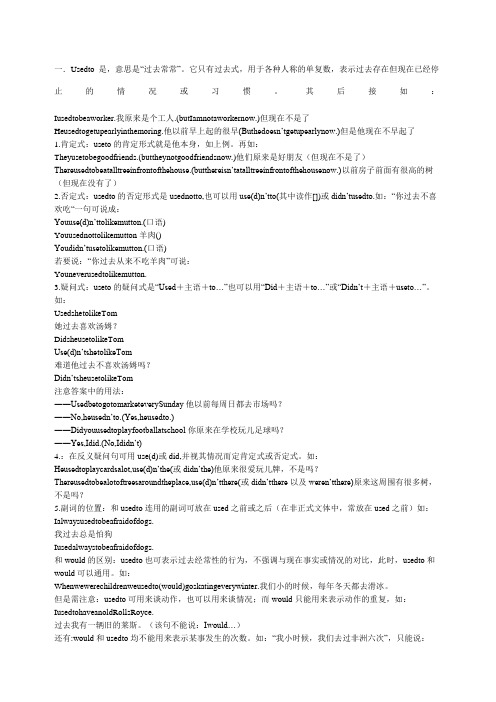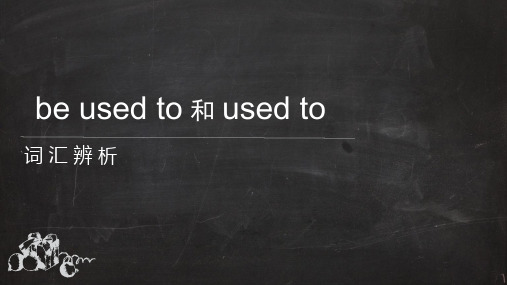usedto和beusedto的区别
- 格式:docx
- 大小:10.10 KB
- 文档页数:2

Used to 意为“曾经”,用于过去持续或经常发生的事,后面跟不带 to 的不定式,be used to 表示习惯于某事,对某事很熟悉或不陌生,而 get used to 表示变得习惯于某事,它们后面跟名词或动名词。
一、用 used to,be used to 或 get used to 完成下面的句子1、He _______ in Spain but now he lives in London.A. is used to liveB. used to livingC. use to liveD. used to live2、Don't worry, it's a simple program to use. You _____ it in no time, I'm sure.A. are used toB. will get used toC. used to useD. will get use to it3、When I had to search for work every day I _____ very early.A. used to getting upB. used to get upC. use to get upD. used to got up4、Sara was shocked when she joined our busy company because she _____ doing much work everyday.A. wasn't used toB. didn't use toC. wasn't use toD. didn't used to5、Working till 10pm isn't a problem. I _____ late. I did it in my last job too.A. am used to finishingB. get used to finishingC. am use to finishingD. none of the above6、See that building there? I _____ to school there, but now it's a factory.A. used to goingB. get used to goingC. used to goD. used to get going7、He _____ several books a month but he doesn't have time any more.A. was used to readingB. used to readC. got used to readingD. use to read8、When ِA hmed was the head of our company , everything _____ well organized. Now it's total chaos here.A. got used to beB. was used to beingC. used to beD. was using to be9、He _____ fat , but now he is thin.A. used to beB. used to beingC. use to beD. used of being10、Did you _____ write poems when you were young?A. used toB. use toC. used not toD. none of the above11、After the holidays it takes me a week _____ up early again.A. to get used to gettingB. to get used to getC. to be used to getD. to be used to getting12、I _____ to play football when I was young. I'm too old and fat to play now.A. usedB. got usedC. useD. was used13、At first it was difficult for her to speak in French all the time but she _____ to it now.A. is usedB. was usedC. usesD. has use二、答案及解析1、used to live解析:He 是第三人称,所以排除use to live;used to do sth,所以排除 used to living;is used to live 意思不合理,所以选 used to live。

初中英语情态动词之 used to情态动词(Modal verbs)本身有一定的词义,表示语气的单词。
但是不能独立作谓语,只能和动词原形一起构成谓语。
拿use to 来举例,下面是小编为您收集整理的初中英语情态动词之used to ,供大家参考!初中英语情态动词之 used toused to “过去常常”,仅用于过去时态中,通常用于所有人称。
1、used to +动词原形,表示过去(有规律的)习惯或过去某一时期的的状况,但现在已不存在。
2、其反意疑问句简略回答中,也有两种形式:didn’t ,use(d)n’t3、used to 和would的区别(1)used to 可表示过去经常发生的动作或存在的状态,而would 仅表示过去习惯性或重复性的动作。
(2)used to 强调过去的行为同现在的对比,含有“过去如此,现在已不再这样了”之意。
Would仅表示过去习惯性动作,没有预先在对比的含义。
(3)used to不能跟表确定时间短的时间状语连用。
(4)used to 可用于无人称句和存在句,而would则不可。
4、used to与be used to do和be used to doing(1)used to表示“过去常常”隐含现在不这样了,其中to是不定式符号,后跟动词原形,仅用于过去时态。
(2)be/get/become used to 表示“习惯于”时,意为“变得习惯于“或“开始习惯于”。
(3)be used to do表示“被用来”。
英语语法串串烧之数词测试及答案数词主要掌握基数词和序数词的用法,也包括一些生活中常用的表示法,如:英语年月日的书写顺序、数字的读法、分数,百分数的表示法、年代、世纪、班级等等。
一、写出下列数字的序数词:1,2,3,5,9,12,20,34二、写出1—12月份:三、选择填空:1.Couldyoutellushowtoreadthenumber18,306,211?A.eighteenmillion,threehundredandsixthousands,twohundre delevenB.eighteenmillion,threehundredandsixthousand,twohundre dandelevenC.eighteenmillions,threehundredsixthousands,twohundreds andelevenD.eighteenthousand,threehundredandsix,twohundredeleven2.Shakespearewasbornin______。

一.Usedto是,意思是“过去常常”。
它只有过去式,用于各种人称的单复数,表示过去存在但现在已经停止的情况或习惯。
其后接如:Iusedtobeaworker.我原来是个工人.(butIamnotaworkernow.)但现在不是了Heusedtogetupearlyinthemoring.他以前早上起的很早(Buthedoesn’tgetupearlynow.)但是他现在不早起了1.肯定式:useto的肯定形式就是他本身,如上例。
再如:Theyusetobegoodfriends.(buttheynotgoodfriendsnow.)他们原来是好朋友(但现在不是了)Thereusedtobeatalltreeinfrontofthehouse.(butthereisn’tatalltreeinfrontofthehousenow.)以前房子前面有很高的树(但现在没有了)2.否定式:usedto的否定形式是usednotto,也可以用use(d)n’tto(其中读作[])或didn’tusedto.如:“你过去不喜欢吃“一句可说成:Youuse(d)n’ttolikemutton.(口语)Youusednottolikemutton羊肉()Youdidn’tusetolikemutton.(口语)若要说:“你过去从来不吃羊肉”可说:Youneverusedtolikemutton.3.疑问式:useto的疑问式是“Used+主语+to…”也可以用“Did+主语+to…”或“Didn’t+主语+useto…”。
如:UsedshetolikeTom她过去喜欢汤姆?DidsheusetolikeTomUse(d)n’tshetolikeTom难道他过去不喜欢汤姆吗?Didn’ts heusetolikeTom注意答案中的用法:――UsedbetogotomarketeverySunday他以前每周日都去市场吗?――No,heusedn’to.(Yes,heusedto.)――Didyouusedtoplayfootballatschool你原来在学校玩儿足球吗?――Yes,Idid.(No,Ididn’t)4.:在反义疑问句可用use(d)或did,并视其情况而定肯定式或否定式。

第07讲used to用法【学习目标】1、要求学生掌握used to概念和用法。
2、掌握used to 与be used to 区别。
3、掌握used to 各种句式。
【基础知识】used to do 泛指过去习惯性的动作或状态,但如今已不存在了(强调与现在对比,暗示现在不做了)。
其中to为动词不定式符号,后接动词原形。
used to 只用于过去时态,没有人称和数的变化。
可以没有时间状语。
意为:主语过去常常做或过去是…一、结构:1、肯定形式:主语+ used to + 动词原形eg: I used to smoke a lot.eg: I used to have long hair.eg: I used to be fat.eg: I used to go to the cinema, but I never have time now.Tom曾经是警察。
_______________________________我过去在一家商店工作。
_______________________________2、否定形式:有2种情况1):sb didn't use to do 2):sb usedn't to doeg: My father didn't use to drink.My father usedn't to drink.3、一般疑问式1):Did sb use to do…..?回答:Yes, sb did ; No , sb didn’t .2): Used sb to do…..?回答:Yes,sb used to ; No, sb usedn’t to .eg:--- Did you use to wear glasses ?----Yes ,I did ; / No, I didn’t .eg:--- Used you to wear glasses?----Yes, I used to . / No, I usedn't.4、反义疑问句1):主语+ used to do sth , didn't + 主语?2):主语+ used to do sth , usedn't + 主语?eg: Your wife used to be a teacher, didn't she?eg: Your wife used to be a teacher, usedn't she?5、特殊句式:there used to be .... 过去常常有...... 。


usedto的用法详解一、used to的基本用法Used to是英语中经常使用的一个短语,表示过去某个时间或状态的习惯或经历。
它通常指代过去已经发生但现在不再存在的事物或状态。
本文主要围绕usedto的基本用法展开详解。
1. 表示过去的习惯Used to可以用来描述过去某种长期持续的动作、行为或状态。
例如:- I used to play tennis when I was young.(我年轻时常打网球)- She used to live in New York.(她曾经住在纽约)2. 表示曾经的情感、态度或信念Used to也可用于表达过去曾经有的情感、态度或信念,而现在已不再如此。
例如:- He used to love playing the piano, but now he has lost interest.(他曾热爱弹钢琴,但现在失去了兴趣)- They used to believe in ghosts, but now they think it's nonsense.(他们曾相信鬼魂存在,但现在认为这是荒谬的)二、used to与be/get/been/getting used to之间的区别除了上述基本用法外,used作为一个动词还有一些衍生形式:be/get/been/getting used to。
下面我们来详细了解这几种构成。
1. be used to表示对某种情况或状态习以为常be used to的意思是“习惯于”或“对...感到习以为常”。
例如:- I am used to the hot weather here now. (我现在已经适应了这里的炎热天气)- She is used to working late nights.(她习惯晚上加班)2. get used to表示逐渐适应某种新的事物、环境或情况get used to意为“适应”,常用于表达一个人慢慢、渐渐地适应新环境的过程。
【⽤法详解】 ⼀、used to (⼀)基本⽤法 used to do⽤来表⽰过去常常或习惯做某事,所以在使⽤时,关键是要判断所要描述的动作是否发⽣在过去。
如: 他⼩时候在⼀家⼩铺⾥⼯作。
上句中的“⼩时候”说明动作发⽣在过去,所以可以这么翻译: As a boy he used to workin a small shop. 再⽐如: 他那时⼀天通常要⼯作14个⼩时。
上句中的“那时”说明动作是发⽣在过去的,所以可以这么翻译: At that time he used to work fourteen hours a day. (⼆)句型转换 used在英语语法⾥也被称作半情态动词,因为它既可以⽤作情态动词,也可以⽤作实义动词,所以在进⾏句型转换时要注意到底是哪种情况。
1、⽤作情态动词时 这时,used的⽤法就跟can/must等差不多了。
如: 肯定句:He used to smoke a lotwhen he was in the college. 否定句:He usedn't to smoke a lot when he was in the college. ⼀般疑问句及其回答:Used he to smoke a lot when he was in the college? Yes, he used. / No, he usedn't. 2、⽤作实义动词时 这时,它的⽤法就跟其他实义动词⼀样了。
如: 肯定句:He used to smoke a lot when he was in the college. 否定句:He didn't use to smoke a lot when he was in the college. ⼀般疑问句及其回答:Did he use to smoke a lot when he was in the college? Yes, he did. / No, he didn't. ⼆、be used to be used to有两种情况: (⼀)be used to do be used to do表⽰被⽤来做某事,属于被动语态的⽤法。
一、学习目标used to 的概念和用法二、重点、难点used to 和be used to 的区别三、考情分析used to 是中考考查的重点知识,主要在单选、词汇运用、动词应用等题型中出现,分值在1-2 分。
【教材原句】He used to be so shy and quiet. 他过去是文静、内向的。
【概念】used to 是一个固定结构,它的意思是“过去经常、以前常常” ,它的后面用动词原形,它表示过去存在某种状态或者过去的某种经常性、习惯性的行为或者动作,并意味着这种动作现在已经不存在,所以它只能用一般过去时,不能用现在时态。
【用法】1. 它的陈述句的肯定形式:主语+used to +动词原形。
I used to play with my friends after school. 过去放学后我常常和朋友们一起玩。
2. 它的否定形式:主语+didn ' t +use to +动词原形。
You didn ' t use to like pop songs. 你过去常常不喜欢流行歌曲。
3. 它的一般疑问句形式:Did +主语+use to +动词原形+其他?Did your sister use to be quiet? 以前你的妹妹常常是很安静的吗?4. used to 的状语可以用副词always ,often ,sometimes 等,但是仍然是过去的习惯,不是指现在的习惯,所以不能用一般现在时。
He always used to be late for class. 他过去常常上课迟到。
5. used to 可以用在there be 结构中表示“过去经常有”的意思。
There used to be a lot of fish in this river. 过去这条小河常常有许多鱼。
【拓展】1. be used to (doing )sth . 意为“习惯于(做)某事” ,可用于各种时态,其中to为介词,used 为形容词,to 后可接名词、代词或动词-ing 形式。
be used to doing表示“习惯于”,后留跟名词或动名词,be也可用get等代替。
be used to
1)如后跟动词原形,表式"被用于",用于被动语态度中,
2)跟V+ing.表习惯于,
used to表示"(过去)习惯于,过去常常":
Wood is used to make into desks.
I used to have a walk after supper, but now I'm used to playing basketball
I am used to shopping alone. 我习惯于一个人购物。
She is used to getting up early. 她习惯于早起。
used to do 表示过去经常发生的事,强调现在已经不存在的习惯。
e.g. I used to get up early when I worked in the factory.
在厂里上班的时候,我通常起得很早。
(现在用不着早起了)
He didn’t use to drink 他过去不喝酒的。
Used to do sth 与be /get used t o的区别与用法Used to do sth过去常常做某事,如:I used to be a young pioneer.I used to jog in the evening.be/get used to sth/ doing sth 习惯于`······/习惯于做某事······I'm used to drinking a cup of water after meal.He's been used to living at the campus.He is used to hard work.注:be used to do(和前面两者没有可比性,意思是“被用来做某事”)This machine is used to clean the wall.This word is used to express a kind of animal.。
练习:用所给动词的适当形式填空:1 You’ll soon get used to (live) in the country .2. I never used to __________(eat) cakes, but I eat a lot now.3. I’m not used to _____________(treat) like this.4. When I was younger I was used to ____________(walk) lo ng distances.(距离)5. I used to ___________(go) swimming on Saturdays.6. Didn’t she use to ____________(live) in Germany?中考连接 1. There ________ a lot of red-crowned cranes in this area.A.was used toB.was used to beed toed to be)2. She used to ______ with her parents, but now she is usedto ______ with her classmates at school.A. live; livingB.live; liveC.living; livingD.living; live)3. He used to ____ in a small village, but now he has been used to ___ in the big city.A. live; livingB.live; liveC.living;livingD.living; live)4. Mrs Green _______ go to hospital, but now she is in good health. A. has to B.need to ed to D.ought to练习答案:1.living 2. eat 3. being treated 4. walking 5. go 6.live中考链接1.D 2. A 3 A 4 C单选。
一.Usedto是,意思是“过去常常”。
它只有过去式,用于各种人称的单复数,表示过去存在但现在已经停止的情况或习惯。
其后接如:
Iusedtobeaworker.我原来是个工人.(butIamnotaworkernow.)但现在不是了Heusedtogetupearlyinthemoring.他以前早上起的很早(Buthedoesn’tgetupearlynow.)但是他现在不早起了
1.肯定式:useto的肯定形式就是他本身,如上例。
再如:
Theyusetobegoodfriends.(buttheynotgoodfriendsnow.)他们原来是好朋友(但现在不是了)Thereusedtobeatalltreeinfrontofthehouse.(butthereisn’tatalltreeinfrontofthehousenow.)以前房子前面有很高的树(但现在没有了)
2.否定式:usedto的否定形式是usednotto,也可以用use(d)n’tto(其中读作[])或didn’tusedto.如:“你过去不喜欢吃“一句可说成:
Youuse(d)n’ttolikemutton.(口语)
Youusednottolikemutton羊肉()
Youdidn’tusetolikemutton.(口语)
若要说:“你过去从来不吃羊肉”可说:
Youneverusedtolikemutton.
3.疑问式:useto的疑问式是“Used+主语+to…”也可以用“Did+主语+to…”或“Didn’t+主语+useto…”。
如:
UsedshetolikeTom
她过去喜欢汤姆
DidsheusetolikeTom
Use(d)n’tshetolikeTom
难道他过去不喜欢汤姆吗
Didn’t sheusetolikeTom
注意答案中的用法:
――UsedbetogotomarketeverySunday他以前每周日都去市场吗
――No,heusedn’to.(Yes,heusedto.)
――Didyouusedtoplayfootballatschool你原来在学校玩儿足球吗
――Yes,Idid.(No,Ididn’t)
4.:在反义疑问句可用use(d)或did,并视其情况而定肯定式或否定式。
如:Heusedtoplaycardsalot,use(d)n’the(或didn’the)他原来很爱玩儿牌,不是吗Thereusedtobealotoftreesaroundtheplace,use(d)n’tthere(或didn’tthere以及weren’tthere)原来这周围有很多树,不是吗
5.副词的位置:和usedto连用的副词可放在used之前或之后(在非正式文体中,常放在used之前)如:Ialwaysusedtobeafraidofdogs.
我过去总是怕狗
Iusedalwaystobeafraidofdogs.
edto和would的区别:usedto也可表示过去经常性的行为,不强调与现在事实或情况的对比,此时,usedto和would可以通用。
如:
Whenwewerechildrenweusedto(would)goskatingeverywinter.我们小的时候,每年冬天都去滑冰。
但是需注意:usedto可用来谈动作,也可以用来谈情况;而would只能用来表示动作的重复,如:
IusedtohaveanoldRollsRoyce.
过去我有一辆旧的莱斯。
(该句不能说:Iwould…)
还有:would和usedto均不能用来表示某事发生的次数。
如:“我小时候,我们去过非洲六次”,只能说:
WewenttoAfricasixtimeswhenIwasachild.(不能说Weusedto(或would)go…)
请注意:以上used之前的主语都是人而不是物。
二.beusedto
1.Beusedto意为“习惯”,其中used是形容词。
to是,其后可按名词或,往往表示一种心理状态。
其除了be以外,还可以用get或become,均用于各种状态。
如:
Iamusedtonoise.我对噪音习惯了
Youwillsoongetusedtodrivingontheleft.你不久就会习惯在昨侧开车了AreyouusedtohardworknowYouwillsoonusedtoit,你现在习惯努力工作了吗你不久就会习惯的Iamnotusedtobeingspokentolikethat。
用那样的态度和我说话,我是看不惯的。
Youcansaywhatyoulike!Iamusedtobeingcriticized.你爱说什么就说什么好了!我已经习惯于受批评乐了。
请注意:beusedto(习惯于)的这种用法,其主语是人而不是物。
2.Beusedto还可以是动词use的结构,意为“被用来……”。
注意:此时,其主语一般是人而不是物。
如:
Thismachineisusedtopumpwater.这种及其是用来抽水的。
Thisknifeisusedtocutbread.这把刀是用来切的。
Andallthisbeautifulsilkwouldbeusedtousedtoweavecolourfulcloudsinheacen.所有这些美丽的都将用来织天上的。